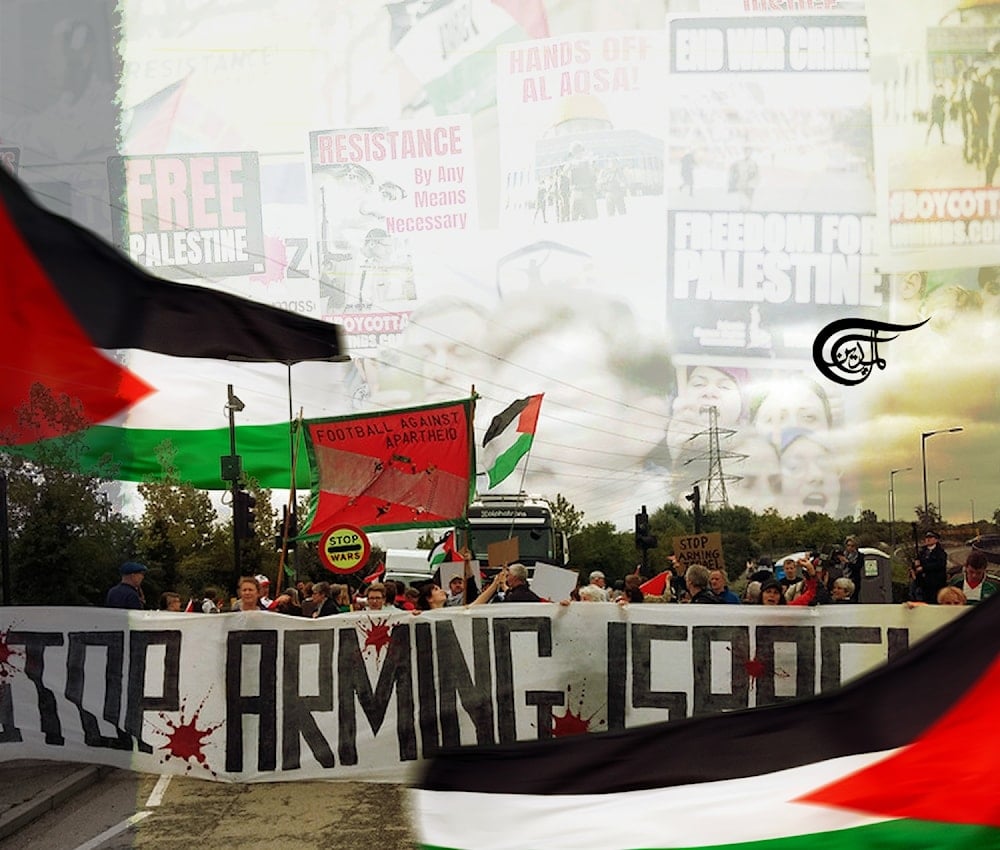Britain's Arms Restrictions are symbolic yet send a meaningful message
The selective arms embargo sends a credible affirmation that the deeds of the Netanyahu government are contrary to international law.
-

Britain's Arms Restrictions are symbolic yet send a meaningful message (Illustrated to Al Mayadeen English by Mahdi Rteil)
At the beginning of this week, the British government announced a revoking of 30 export licenses for arms related products to Tel Aviv, explicitly stating that it was their assessment that some of these munitions were being used contrary to international law. The embargo, although far from being comprehensive, was quickly condemned by supporters of Netanyahu’s government, who also responded by attempting to frame itself as if it were the “victim”, despite over 41,000 people having died in the invasion and carpet bombing of Gaza, and humanitarian conditions deteriorating so severely that some major diseases, such as polio, have resurfaced.
Given that the benchmark of expectations from Britain is very low regarding this subject matter, it is a welcome step that some form of action, as symbolic as it may be, has been taken by the government. This was not expected all but a few months ago, given that previously while in opposition, Keir Starmer worked relentlessly to purge criticism of Zionism from his party, supported the destruction of Gaza, and for a great length of time, even opposed a ceasefire. However, upon taking office, his foreign policy has proved far more pragmatic than anticipated.
One factor in this is that the Labour Party lost a great deal of Muslim votes in the 2024 election, largely winning due to the incompetence of its opponents, and several independent MPs (including party leader Jeremy Corbyn) even defeated Labour in these communities. Thus, while in government, it is imperative for balance in the Labour Party; to be seen to be doing something concerning Gaza, and thus providing a contrast to the Conservative Party’s unconditional backing of Netanyahu and the war in Gaza. However, given the state of the British media, and the reality that it remains an overall elite consensus supporting Zionism in the West, as well as irking the United States, not much more can be expected from the UK government.
Despite this, the message that this selective embargo sends is meaningful and has political substance to it. First, it sends a credible affirmation that the deeds of the Netanyahu government are contrary to international law, something its supporters in the West want to brush under the carpet, and thus comes as an acknowledgement that this conflict has brought about wide and large-scale human suffering. It is not propaganda and not an exaggeration to make such a point. Second, given the United Kingdom is often the “second advocate” of American led foreign policies, and is used strategically to “back them up” in compelling Europe to follow suit, the political influence of the United Kingdom gives other countries political space to criticise the situation in Gaza and set a precedent that they can hide behind.
For example, if the UK is suspending certain arms exports, this gives the green light for other countries in Europe to follow suit. The rolling effect of this decision is that it changes the debate and makes it ever so more difficult for certain parties to shut down the debate over Gaza with the other tropes, and therefore raises the moral costs of supporting the catastrophe in Palestine. In addition, this also increases the political costs of Netanyahu pursuing his now parallel campaign in the West Bank, which should be accurately assessed as attempting to provoke a conflict, again claim the state is victimised, and therefore use large scale military assaults to destroy buildings, seize land and annex territory. This also, as unlikely as it may still be, opens the way for people to push the British government and the debate on the issue further.
However, the overall question is what difference will this make? The Netanyahu government is ultimately relentless, and insomuch it continues to receive unconditional backing from the United States, it is fair to assess his actions will continue, even if at an increased cost. The UK’s decision may be an important crack in the dam, but advocates for Palestine will rightfully argue that there is far more to be done before the “floodgates” are metaphorically opened. There are still too many influential people, organisations, and countries happy to greenlight the violent campaigns in the occupied territories of Palestine, but even the subtle recognition in Westminster that such is actually happening will certainly be taken as a good starting point.

 Tom Fowdy
Tom Fowdy
 4 Min Read
4 Min Read











